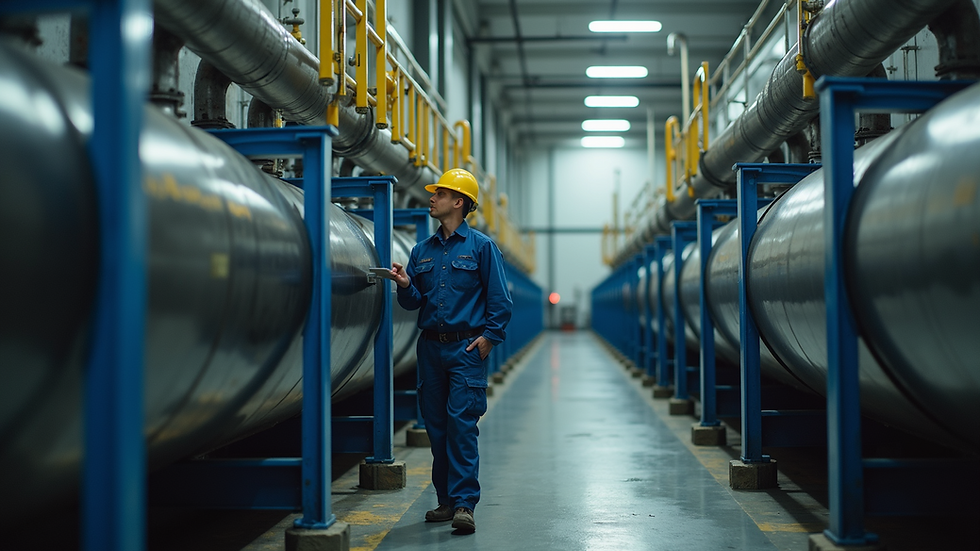Navigating Industrial Wastewater Challenges in India
- palwinder kaur
- Sep 25, 2025
- 3 min read
India's rapid industrial growth has brought significant economic benefits but also created complex environmental challenges. Among these, managing industrial wastewater has become a critical concern. Industrial wastewater, if not treated properly, can lead to severe pollution of water bodies, affecting ecosystems and public health. This article explores the key challenges India faces in handling industrial wastewater and offers practical insights into effective management strategies.
Understanding Industrial Wastewater Challenges in India
India's industrial sector is diverse, ranging from textiles and chemicals to pharmaceuticals and food processing. Each industry generates wastewater with unique characteristics, making treatment a complex task. The challenges include:
High pollutant load: Industrial effluents often contain toxic chemicals, heavy metals, and organic pollutants that are difficult to treat.
Inadequate infrastructure: Many industries lack proper wastewater treatment plants (WWTPs) or rely on outdated technology.
Regulatory enforcement gaps: Although regulations exist, enforcement is inconsistent, leading to untreated discharge.
Water scarcity: Reusing treated wastewater is essential in water-stressed regions, but adoption remains low.
Cost constraints: Small and medium enterprises (SMEs) often find it expensive to install and maintain treatment systems.
Addressing these challenges requires a multi-faceted approach involving technology, policy, and awareness.

What is the meaning of industrial wastewater?
Industrial wastewater refers to the liquid waste generated from industrial processes. Unlike domestic sewage, this wastewater contains a variety of pollutants depending on the industry type. For example:
Textile industry: Dyes, salts, and chemicals.
Chemical manufacturing: Toxic compounds and heavy metals.
Food processing: Organic matter and nutrients.
Pharmaceuticals: Complex organic molecules and solvents.
The composition of industrial wastewater makes it challenging to treat using conventional methods. Specialized treatment processes such as chemical precipitation, biological treatment, membrane filtration, and advanced oxidation are often required. Proper treatment ensures that the water released into the environment meets safety standards and can be reused where possible.

Key Strategies to Overcome Industrial Wastewater Challenges
To effectively manage industrial wastewater, industries and policymakers must adopt comprehensive strategies:
1. Implementation of Advanced Treatment Technologies
Modern treatment technologies can significantly reduce pollutant levels. Some effective methods include:
Membrane bioreactors (MBR): Combine biological treatment with membrane filtration for high-quality effluent.
Electrocoagulation: Uses electrical currents to remove heavy metals and suspended solids.
Zero Liquid Discharge (ZLD): Aims to recycle all wastewater, leaving no discharge.
2. Strengthening Regulatory Framework and Compliance
Strict enforcement of environmental laws is crucial. Authorities should:
Conduct regular inspections.
Impose penalties for non-compliance.
Encourage industries to adopt cleaner production techniques.
3. Promoting Industrial Symbiosis
Industries can collaborate to use each other's waste streams as raw materials. For example, wastewater from one plant can be treated and reused by another, reducing overall pollution.
4. Capacity Building and Awareness
Training industry personnel on wastewater management and environmental impact can improve compliance and innovation.
5. Financial Incentives and Support
Government subsidies, low-interest loans, and tax benefits can encourage industries, especially SMEs, to invest in wastewater treatment.

The Role of Sustainable Practices in Industrial Wastewater Management
Sustainability is key to long-term success in managing industrial wastewater. Industries should focus on:
Reducing water consumption: Implementing water-efficient processes to minimize wastewater generation.
Recycling and reuse: Treating wastewater to standards that allow reuse in cooling, cleaning, or irrigation.
Pollution prevention: Using less harmful raw materials and optimizing processes to reduce pollutant load.
Adopting these practices not only helps the environment but also reduces operational costs and enhances corporate reputation.
Leveraging Technology and Innovation for Better Outcomes
Emerging technologies offer promising solutions for India's industrial wastewater challenges:
IoT and real-time monitoring: Sensors can track water quality and treatment efficiency, enabling timely interventions.
Artificial intelligence (AI): AI algorithms optimize treatment processes and predict maintenance needs.
Bioremediation: Using microorganisms to degrade pollutants naturally.
Investing in research and development will accelerate the adoption of these innovations.
Final Thoughts on Industrial Wastewater Management in India
India's industrial wastewater challenges are significant but not insurmountable. By combining advanced technology, strong regulatory frameworks, sustainable practices, and collaborative efforts, industries can mitigate environmental impacts effectively. The path forward requires commitment from all stakeholders to ensure cleaner water resources for future generations.
For industries seeking expert solutions, exploring industrial wastewater treatment technologies and services can be a vital step towards sustainable operations.



Comments